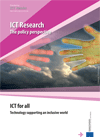
In this report produced for the publication series ICT Research: The Policy Perspective, is explored Europe's vision for a society where every individual can make a valuable contribution. Investments in pioneering and commercially focused research will produce information and communication technologies (ICTs) that should help everyone - including the elderly, disabled and marginalised - to fulfil their potential.
There is little doubt that ICT is the key enabling technology for European society. It is vital for business and powers our financial systems. It delivers our entertainment and keeps us in touch with friends and communities. Without ICT - our computers, televisions, mobile devices, plus all the technology embedded in everyday objects - we would struggle to work, shop and travel.
So how is it, then, that almost a third of European citizens - around 150 million people - are not actively participating in this modern, high-tech society? Fewer than 15% of people aged 65 and only one in three of the unemployed regularly use the internet. About 74 million Europeans with low levels of education and a third of people in rural and remote areas remain 'unconnected'.
Download ICT Research: The Policy Perspective (.pdf, 605 KB).
Download from eHealthNews.eu Portal's mirror: ICT Research: The Policy Perspective (.pdf, 605 KB).
Content for this publication was provided by the ICT Results editorial service, working to showcase breakthrough ICT research in Europe. It is part of a series of domain surveys drawn together from articles featuring EU-funded ICT research.
For further information, please visit:
http://cordis.europa.eu/ictresults